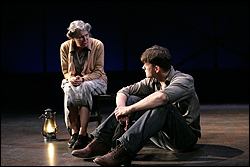John Steinbeck’s Joad family, like most extended clans that made the trek out West during the Great Depression, doesn’t complain much. They suffer and soldier on and don’t demand that anyone pat them on the back for it. That stoicism is admirably rendered by director Linda Hartzell in Intiman Theatre’s The Grapes of Wrath (through Sunday, Nov. 13; 206-269-1900, www.intiman.org), but it’s her very restraint that keeps the production—crushingly lovely denouement aside—from ever really grabbing you.
Steinbeck’s source novel may not have gripped you or your peers when foisted upon you in high school, but there should be little argument that the story is dismayingly relevant now. Driven out of their home state by economic and ecological collapse, the Joads pack what they can onto a humble flatbed and head out in search of the greener prosperity that America has always promised its downtrodden. It doesn’t exist, of course—though that’s something Ma (Beth Dixon) and Pa (Patrick Husted) can’t let stop them or their truckload of dependents. Hartzell knows that these are not the kind of people to make a big show of strife, and her spare, empathetic touch carefully steers this scenario away from tiresome reverence and places it into the arena of actual human behavior. Moments of hope or joy aren’t overburdened with an ostentatious irony meant to prod us into noticing how very valiant these unfortunate souls are. Scenes that find the Joads and friends fixing their last supper in Oklahoma, or splashing happily in the Colorado River midtrek to California— prepare to marvel at the expressionistic grace of Carey Wong’s sets and Mary Louise Geiger’s unfettered lighting—have an ease that accords the characters a casually momentous respect without trafficking in symbols. By not leaning heavily into speechifying and allowing even the bristling, ex-jailbird Tom Joad (Erick Kastel) to sound no more or less than he is, Hartzell has assured that we’ll take these folks not as literary lions but as uncomfortably close to our own kin.
She’s also, unfortunately, assured that the material doesn’t quite stick the way you might expect. Steinbeck, too, respected this generation of survivors, but, let’s face it, he was speechifying—passionately, eloquently. Without all of the novel’s bulk to cushion his compassionate rage at a country abusing its huddled masses, Steinbeck at full force in Frank Galati’s Tony-winning adaptation sounds like Clifford Odets’ wet dream of an inspirational Communist. If you leave the theater not pondering the holiness of the whole as opposed to the selfishness of the individual, you haven’t been listening.
This is material begging for Big Moments, yet while Hartzell delicately punctuates the agonizing splintering of an American family, she wants us to wonder at the protagonists’ artless heroism by, in a sense, making molehills out of mountains. Yes, the people that Steinbeck so regarded never asked to be saluted, but the people he wrote certainly do. How many battered, Dust Bowl Oklahomans could ever have summoned the novel’s famously poetic exit lines (“I’ll be everywhere. Wherever there’s a guy getting beat up by a cop, I’ll be there . . . “), delivered by Tom to Ma before he flees punishment for avenging the death of anarchic ex-preacher Jim Casy (Todd Jefferson Moore, effective but without the brooding heft of a former man of the cloth)? The subtly furious Kastel gets a little choked up by the unavoidable magnificence of the words, and Dixon—whose masterfully full-bodied, matter-of-fact maternal spirit is the main reason to see the show—gets to crumble quietly for a second afterward, but the scene stops just short of knocking you out.
The production does finish with one tight clutch on your heart. Rose of Sharon (Autumn Dornfeld), still shattered and near-somnambulant by the recent stillbirth of her child, finds her soul’s salvation by breast-feeding a starving man. It’s a surpassingly poignant scene, enacted by Dornfeld with a look of almost placid awe and staged by Hartzell without an ounce of overwrought sentiment. But in a long show playing against every obvious intent, it may be one moment too many to pretend it doesn’t mean more than it does.








